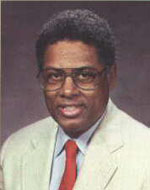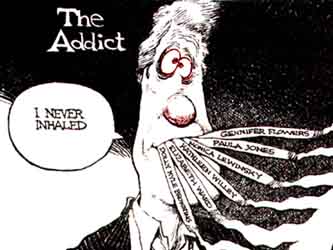|
|
Thomas Sowell
JUDGE SUSAN WEBER WRIGHT'S dismissal of Paula Jones' lawsuit against President Clinton
has been portrayed as a "vindication" by some White House defenders and their media
allies. No doubt many members of the public will take this to mean that Judge Wright did
not believe Paula Jones' allegations against Clinton. Nothing could be further from the
truth.
What was involved was what the lawyers call a "motion for summary judgment." When
If the motion is denied and the case goes to trial, then it is up to a jury to decide whether
the allegations really are true. When the judge dismisses the case, it means only that even
a truthful allegation would not meet the legal criteria for having a trial.
In other words, we don't know any more about who was lying and who was telling the truth
now than we did before Judge Susan Webber Wright made her ruling. Neither does the
judge. Nor does she pretend to.
In short, nobody has been "vindicated," despite the disinformation being spread by Clinton
supporters.
There is a tendency in the media to regard judicial rulings as showing that the judge came
out "for" or "against" one side or the other as regards the right and wrong of the issue.
Fortunately, that is not the role of a judge in the American system of law.
It would be sheer despotism for judges to take on the roles of both judge and jury, making
rulings based on how they personally see the issues, rather than restricting themselves to
following the procedures set down for them by the law.
Such legal fine points may be frustrating to the person who feels wronged and can get no
satisfaction from the courts. It may be especially galling when a case is dismissed on narrow
legal grounds and the other side proclaims that as a "vindication," as if they had been
found innocent.
All this has a special meaning to me because I was once urged to sue one of the three big
television networks for broadcasting a bald-faced lie about me. Attorneys from two
different law firms wrote to me and offered to represent me in a lawsuit, because they had
heard the broadcast and had also read my writings, and knew what hogwash the reporter
was talking.
There was no question in my mind that I had been slandered and my reputation damaged
when the reporter attributed to me outrageous beliefs that I had in fact opposed in various
writings over the years. What was not so clear was how all this would play out in a court of
law.
To launch a lawsuit would be to give wider publicity to a lie. And, if the network escaped
through one of the legal loopholes, they would undoubtedly proclaim that they had been
"vindicated" -- which many people would take to mean that what they had broadcast was
true.
On the other hand, if the case had gone to trial and I had won, then I might easily have
become rich. But, when you have lived more than half a century without being rich, you can
probably make it the rest of the way without being rich.
In the end, I decided that I was not going to put all my work and my life on hold for months
-- perhaps years -- while I got absorbed in all the hassles that go with a big lawsuit. Today,
the lie that was broadcast has long since been forgotten and, if anybody ever brings it up
again, I can easily disprove it.
Whether or not Paula Jones will appeal Judge Wright's decision is of course up to Ms.
Jones. If her charges are true, then it must be a bitter experience to see them all dismissed
on narrow legal grounds.
For the country as a whole, however, it would be even worse to have judges rule on the
truth or falsity of allegations. The American system of government splits power, not only
among the three branches of government, but also as between judges and juries.
All this goes back to the Founding Fathers' belief that no one should be trusted with too
much power. Ironically, what Bill Clinton is being accused of, not only by Paula Jones and
not only as regards his sexual activities, is precisely an abuse of power. That is the much
larger issue that is being buried by the media's obsessive focus on
 Was Clinton ‘vindicated'?
Was Clinton ‘vindicated'?
 such a motion is being considered by a judge, the issue is never who is lying and who is
telling the truth. The law requires the judge to assume, for the sake of argument, that the
plaintiff's allegations are true and then decide whether they would constitute a basis for a
trial if they were.
such a motion is being considered by a judge, the issue is never who is lying and who is
telling the truth. The law requires the judge to assume, for the sake of argument, that the
plaintiff's allegations are true and then decide whether they would constitute a basis for a
trial if they were.
3/26/98: "Diasters -- natural and political"
3/24/98: "A pattern of behavior"
3/22/98: Innocent explanations
3/19/98: Kathleen Willey and Anita Hill
3/17/98: Search and destroy
3/12/98: Media Circus versus Justice
3/6/98: Vindication
3/3/98: Cheap Shot Time
2/26/98: The Wrong Filter
2/24/98: Trial by Media
2/20/98: Dancing Around the Realities
2/19/98: A "Do Something" War?
2/12/98: Julian Simon, combatant in a 200-year war
2/6/98: A rush to rhetoric